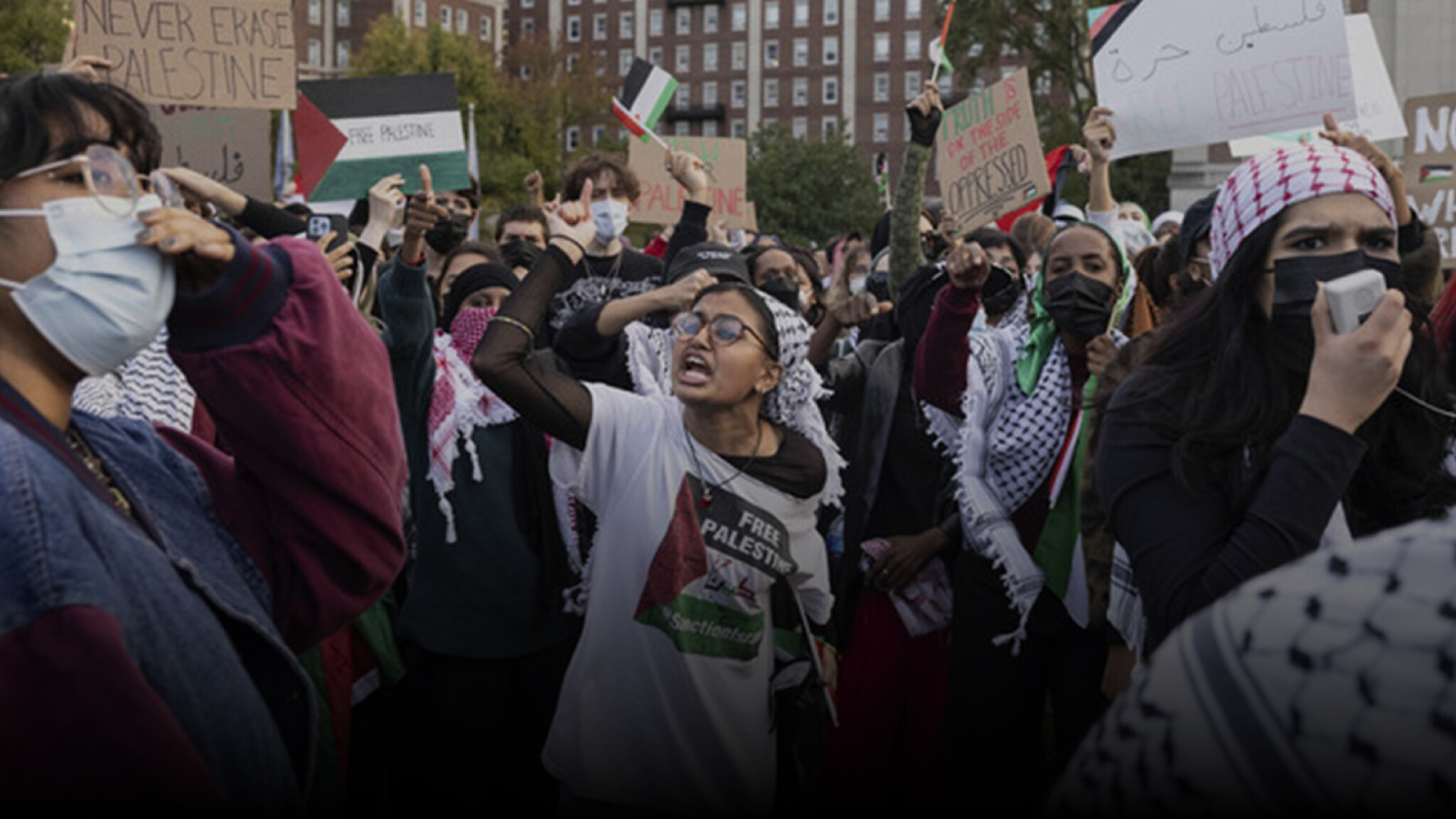
Palestinian supporters protest at Columbia University, New York, on Oct. 12, 2023.
Source: Yuki Iwamura/AP
The showdown between the Trump administration and US Universities continues apace. The US government has just pulled almost $4 million in federal funding from Princeton University’s climate department on the grounds that it promotes exaggerated and implausible climate threats, contributing to a phenomenon known as “climate anxiety”, which has increased significantly among America’s youth. This follows the White House’s decision to investigate 60 universities for potential civil-rights violations against the Jewish community in the wake of October 7th, revealing how the government’s agenda has expanded into a broader review of the potentially pernicious and profligate uses of taxpayer money by universities. It also recalls a remarkable moment in Trump’s first administration: after Princeton declared itself to be systemically racist in what was meant as a performative act of self-flagellation by the university president, Trump launched an investigation into the university for unlawful discrimination.
The universities facing the most significant funding freezes include Northwestern and Cornell, which face funding freezes of $790 million and $1 billion respectively. Since 2023, reports of incidents including the superimposition of antisemitic caricatures onto student newspapers, aggression towards Israeli Americans and Jewish students alike, and extreme pro-Hamas rhetoric in campus protests have abounded.
Enjoy independent, ad-free journalism - delivered to your inbox each week
Academics who openly express pro-terror views, or are even linked to terror organisations, have exerted considerable influence on the culture of ideological intimidation at universities, including several Ivy Leagues. They are now facing repercussions: Rasha Alawieh, assistant professor at Brown University, has been deported to her native Lebanon after she attended the funeral of Hezbollah terrorist Hassan Nasrallah, responsible for hundreds of American deaths. Alawieh was found to have sympathetic photographs and videos of Nasrallah and Ayatollah Ali Khamenei, in addition to a track record of significant pro-terror activism at Brown following October 7th. The reaction at the university was one of concern for “democracy” and academic freedom.
There are valid concerns that students might be punished simply for expressing pro-Palestine views on campus; one Cornell student has been asked to turn himself in for deportation by US Immigration and Customs Enforcement, to the alarm of many. But Momodou Taal is a foreign student with a track record of antisemitism, publicly endorsing a “by any means necessary” narrative regarding Palestinian violence. The situation does nothing to suggest that US citizens are not facing any threat against their lawful freedom of expression.
The news has not just drawn attention to the left-wing activism dominating universities, but also to the sheer amount of funding that these institutions receive from the taxpayer. If universities chronically depend on state funding, despite charging extortionate amounts to students in fees, there is probably something wrong with their fiscal models. But, rather than addressing the core problem – that they can’t function without massive state subsidies – they’ve instead developed the notion that federal funding is owed to them: their response to Trump’s investigations has ranged from confusion to defiance. Northwestern Professor Kevin Boyle has stated that “the nature of it is still really hard to understand”. Reproductive-rights activists and former Visiting Professor at the University of Maryland Elissa Nadworny has claimed that universities could sue the government for the legal action of freezing federal funding during an investigation. Columbia graduates performatively tore up their diplomas as part of a general pro-Palestine, anti-Trump protest. There has been no acknowledgement of the problems besetting university campuses, which include a readiness to “cancel” academics and students for infractions as minor as having sex-realist beliefs or refraining from using “neo pronouns”, which have led to Republican suspicion of university activity. There has been no push to examine the political influence of the ever-burgeoning administrative industry in higher education.
In both the humanities and across the sciences, woke activism and administrative bloat are endemic and inextricable from the hiring processes, allocation of research funding, and the very language and conceptual environment of American higher-education. Entire books could be written examining the myriad forms this ideological stranglehold takes. One recent attempt to invite academics and bureaucrats at Brown University to self-scrutinize, in the wake of DOGE’s emails to government employees probing their productivity, has illustrated the problem of bloat in academic institutions. Brown is currently set to charge students over $93,000 a year and still operates at a $43 million budget deficit; it, too, is being investigated by the government for potentially violating the Civil Rights Act. Alex Shieh, a sophomore at the university, has set up an AI algorithm to analyse the impact of every administrator on the university and to sift academic administrative jobs into three domains: “legality, redundancy, and bullshit”. Shieh also emailed Brown’s employees with the DOGE-style request that they explain their roles and how students would be affected if their employment were terminated. Predictably, he was threatened with disciplinary action by the university for claiming that administrative bloat and ideological extremism could lose Brown over $500 million in federal funding – a claim that was later confirmed by the White House to be true.

A Brown student used AI to critique administrative excess, prompting institutional backlash—until federal concerns affirmed his core thesis.
University culture is race-obsessed, accounting for the intensity of the campus activism over the Israel-Palestine conflict, which students read through a racial lens. Affirmative action, though ruled unlawful by SCOTUS in 2023, has shaped and continues to define campus culture at the top American universities. In the words of Richard Hanania, “Institutions have been allowed to operate contrary to the text of the Civil Rights Act, the common understanding of the law when it was passed, and the plain meaning of the Fourteenth Amendment. Entire careers, fields of research, and business models have been built on the idea that citizens should be constantly classified and judged based on race.”
The universities are so addicted to their racial ideology that they responded to this ban with various quasi-loopholes, like the effective requirement that successful applicants lament their personal experiences of race-based injustice and oppression in their application letters. They could just about get away with defying the implicit injunction to judge candidates on merit rather than racial biography. Similarly, now that these institutions are finally being checked in a large-scale and materially consequential way, they are responding not with self-examination but with outrage. This should give us pause before we celebrate the alleged “vibe shift” – higher educational institutions will require more than just a slap on the wrist or even, it seems, significant financial punitive measures in order to change. They will require a near-totalizing change in personnel.
This publication takes the view that more, not less, federal cuts could well be implemented for the sake of public intellectual health. The Department of Education’s National Resource Centers program (NRC) funds university activism at the elementary- and middle-school level. As such, it is responsible for the indoctrination of children, not just young adults, via workshops and “outreach” programs which push woke, race-obsessed ideology to K-12 pupils throughout the nation. This City Journal survey of various university-run NRC workshops and institutes is just a brief snapshot of NRC activity: for instance, one event run by George Washington University’s Institute for Middle East Studies characterized the IDF’s pager attack on Hezbollah as a feature of genocide.
As it stands, the defining characteristic of American academic institutions in the present day is puerile entitlement. Universities hemorrhage money on administrative employees whose chief purpose is to ossify and enforce woke ideological norms on campus; their financial profligacy leaves them partly dependent on federal funding to function, the source of which matters very little to academics in their high towers whose woke activism is ironically reinforced by their lack of personal exposure to the working classes. Nothing could better illustrate this endemic entitlement than the universities’ response to DOGE’s threat of withdrawal of federal funding from institutions which have been assessed by the Department of Justice and found to be noncompliant with civil-rights law. Their whiplash-inducing appeal to academic freedom – like that of Cornell’s President – reveals that they only care for the concept if it suits them financially. But, as they themselves like to say, academic freedom is not the same thing as freedom from consequences.




Comments (0)
Only supporting or founding members can comment on our articles.